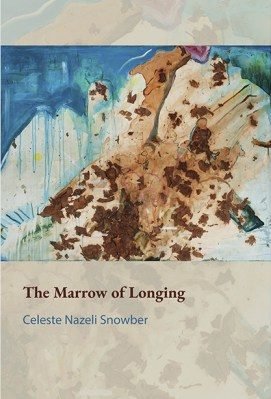
A descendant of Armenian genocide survivors, Celeste Nazeli Snowber explores the relationship between longing, belonging and identity in her third book of poetry. With The Marrow of Longing, Snowber uncovers universal themes as she traces her own heartaches, yearnings and lessons learned in the kitchen.
The inherited and intergenerational trauma of the Armenian Genocide marked Snowber’s childhood. Her poems express both a sense of loss and the satisfaction of being a survivor and witness.
Snowber’s work is always both deeply personal and deeply interpersonal. In excavating her own vulnerabilities and longings, she invites the reader into a community of reflection: “look beneath the surface / how many dimensions/ one object, one heart holds.”
“Fragments can hold a world,” writes Snowber. In reflecting on her own childhood, The Marrow of Longing, explores universal experiences: fragmented memories of grandparents, parents’ love letters, the tastes of a mother’s cooking, prayers in the night.
Award winning B.C. poet Susan McCaslin describes The Marrow of Longing as “a liminal site where land, food bodysoul, the domestic and wild intermesh…a world where an Armenian mother’s sweeping of floors sweeps us into an ever present, enduring love.”
Snowber’s mother was born in historic Armenia in 1912 before immigrating to Boston. Motherhood is a recurring theme within The Marrow of Longing. She recalls the lessons learned in kitchen conversations with her mother: the biographical details, the recipes of the old country, the wisdom of the ancestors. “My mother had an / eggplant soul / a beauty of both / dark and light / rough and tender…the meeting of art and life / just beneath the skin of plum black.”
A relation to place is always central in Snowber’s works. In these poems, she speaks directly to her ancestral homeland as a living entity: “I am letting you / wash over me Armenia / stone to stone /kachkar to kachkar, / lavash to lavash/ … dance my olive skin / on your baptized land.”
Film director Atom Egoyan wrote of the work, “It’s so good to see that our artists continue to so carefully share our complex and unresolved history through their personal journeys.”

Snowber is a dancer, poet, writer, award-winning educator and professor in the Faculty of Education at Simon Fraser University. Her previous books include Embodied prayer and Embodied inquiry: Writing, living and being through the body and two collections of poems: Wild tourist: Instructions to a wild tourist from the divine feminine and co-author of Blue Waiting. As the Artist-in-Residence in the University of British Columbia Botanical Garden, she created full-length performances connecting poetry and the natural world. Her one-woman shows, which combine voice, comedy and dance, have been performed in a variety of venues, including concerts, galleries, museums, conferences and outdoor spaces around the world.
The Marrow of Longing is available in print (90 pages) from HARP Publishing: The People’s Press of Nova Scotia. Along with 54 poems, The Marrow of Longing contains seven full-color illustrations by Boston-based artist Marsha Nouritza Odabashian which showcase her own Armenian ancestral past with the present. Partial proceeds from the sale of the book will benefit the Atken Armenian Foundation of Montreal supporting Armenia’s development through cultural and economic development initiatives.
New Westminster Poet Laureate Candice James calls the collection “a gentle generational walk down a highway of smiles and tears.” Armenian poet Lola Koundakjian describes it as “a morsel of joy.” Canada Research Chair, poet and artist Pauline Sameshima invites readers to be “swept into Snowber’s embrace as she wraps you in voices, echoes and sighs. Read and be reborn.”



I love the work this poet has done and am looking forward to reading more of it.
I am inspired by this dancer poet to release the floodgates of my own lost heritage,to mine my loss even though the trail back is patchy, delicate and faint. We lose something when we flee from a homeland whether in my family that be my Romainian, Scottish & English great grandparents or today, immigrants from war torn countries and refugee camps. This poet shows us how to excavate meaning from snippets and memories. I look forward to reading this book. I suspect I will take up my own pen and dig.